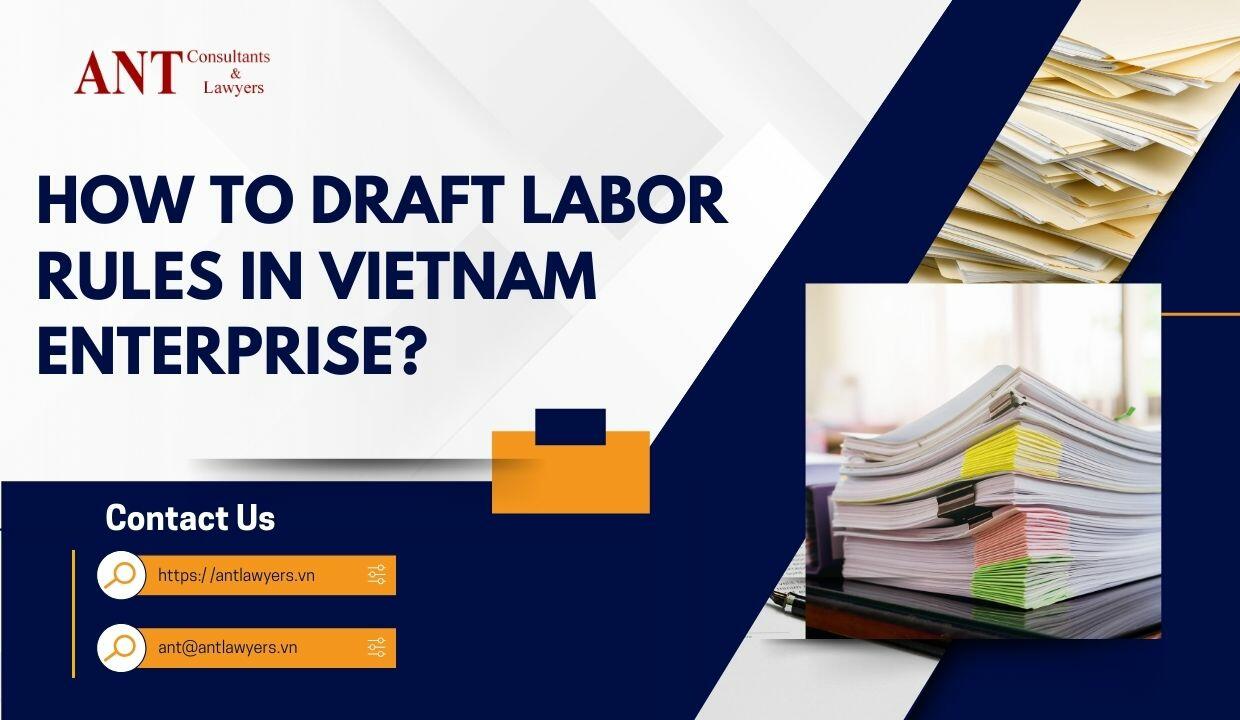Draft Labor Rules in Vietnam in Accordance with Vietnam Labor Code
In adherence to the stipulations outlined in the Vietnam Labor Code, to draft labor rules in Vietnam that comply is a crucial aspect for employers. There are some important points to cover for employers to draft the labor rules in Vietnam in accordance with Vietnam Labor Code as follows:

Mandatory Issuance of Labor Rules
Employers, when employing ten or more workers, are mandated to draft labor rules in Vietnam enterprise. If the workforce is less than ten, while a written document is not obligatory, an agreement on labor discipline and material responsibilities within the labor contract must be established.
Content in Labor Rules
The content of labor rules must conform to labor laws and related legal provisions when the employers draft labor rules in Vietnam. Key components for employers to consider to draft labor rules in Vietnam is to encompass:
- Working hours and breaks: Defining normal working hours per day and week, shifts, start and end times of shifts, overtime regulations (if applicable), specific circumstances for overtime, break schedules, rest periods between shifts, weekly days off, annual leave, personal leave, and unpaid leave.
- Workplace order: Specifying the scope of work, movement during working hours, workplace etiquette, adherence to work assignments, and employer-authorized adjustments.
- Occupational safety and hygiene: Detailing responsibilities for compliance with safety and hygiene regulations, fire prevention, usage and storage of personal protective equipment, and workplace hygiene and disinfection measures.
- Prevention of sexual harassment: Establishing measures to prevent and address incidents of sexual harassment at the workplace, along with procedures for handling such cases.
- Protection of property and business secrets: Outlining the inventory of assets, documents, technological secrets, business secrets, and intellectual property. Defining responsibilities and protective measures against infringements.
- Temporary work relocation: Clearly specifying cases where employees may be temporarily reassigned due to production or business needs.
- Violations of labor discipline and disciplinary measures: Providing detailed regulations on violations of labor discipline and the corresponding disciplinary measures for each infraction.
- Material responsibilities: Defining situations where employees are required to compensate for damages caused by damaging equipment, exceeding material consumption norms, or unauthorized use of materials. Determining the level of compensation corresponding to the degree of damage.
- Authorized personnel for labor discipline handling: Designating the personnel authorized to enter into labor contracts on behalf of the employer or individuals specifically identified in the labor rules.
Consultation with Employee Representatives
Prior to issuing or amending labor rules, employers must seek the opinions of the representative organization of employees at the grassroots level, where applicable.
Dissemination and Notification
After issuance, the labor rules must be sent to each representative organization of employees at the grassroots level (if any) and communicated to all employees. Additionally, key content must be posted at necessary locations within the workplace.
Ensuring that labor rules are not only in compliance with legal standards but also considerate of employee well-being is paramount when the employers draft labor rules in Vietnam. Employers should approach the drafting process meticulously, seeking feedback from employee representatives, and disseminating the rules effectively to create a transparent and harmonious work environment.
Why Draft Labor Rules in Vietnam Is Important?
To draft labor rules in Vietnam to align with the Vietnam Labor Code requires careful consideration of various factors to ensure legal compliance, transparency, and a harmonious working environment. Here are some essential aspects to consider when the employers draft labor rules in Vietnam:
Legal Compliance
Labor Laws and Regulations: Ensure that the labor rules adhere to the provisions outlined in the Vietnam Labor Code and other relevant legal documents. Regularly update the rules to reflect any changes in labor legislation.
Content of Labor Rules
Thoroughness and Specificity: The labor rules should be detailed, covering various aspects such as working hours, breaks, safety measures, disciplinary actions, and material responsibilities. Specificity helps avoid ambiguity and ensures clear understanding.
Customization: Tailor the rules to the specific needs and nature of the business. Different industries may have unique requirements, and rules should be customized accordingly.
Employee Participation and Representation
Consultation: Actively seek the opinions and input of employees or their representatives when drafting or amending labor rules. This fosters a sense of involvement and can lead to rules that are more widely accepted.
Communication: Clearly communicate the finalized rules to all employees. Translation into local languages may be necessary, especially if there are diverse linguistic backgrounds among the workforce.
Occupational Safety and Health
Risk Assessment: Conduct thorough risk assessments to identify potential hazards in the workplace. Develop and implement measures to mitigate these risks, and clearly outline them in the labor rules.
Emergency Procedures: Provide guidelines on emergency procedures, including evacuation plans, first aid, and communication protocols in case of accidents or emergencies.
Disciplinary Measures
Fairness and Consistency: Clearly define prohibited behaviors and corresponding disciplinary measures. Ensure that disciplinary actions are administered fairly, consistently, and in accordance with the severity of the offense.
Due Process: Outline the procedures for handling disciplinary cases, including providing employees with an opportunity to present their side of the story before any disciplinary action is taken.
Confidentiality and Intellectual Property
Protection of Business Information: Clearly articulate the protection of confidential business information, trade secrets, and intellectual property. Specify the consequences of unauthorized disclosure or use of such information.
Training and Orientation
Employee Training: Implement orientation programs to familiarize new employees with the labor rules. Conduct regular training sessions to keep existing employees informed about any updates or changes.
Accessibility: Ensure that all employees have easy access to the labor rules. Consider providing a handbook or online platform for reference.
Regular Review and Updates
Periodic Review: Schedule regular reviews of the labor rules to assess their effectiveness and relevance. Update the rules promptly to reflect changes in the business environment or legal requirements.
Feedback Mechanism: Establish a feedback mechanism for employees to express their concerns or suggestions regarding the labor rules. Use this feedback to improve the rules over time.
By paying careful attention to these considerations, employers can draft labor rules in Vietnam that not only comply with the Vietnam Labor Code but also contribute to a positive work environment, fostering a culture of transparency, fairness, and mutual respect between employers and employees. The employers could hire a labor law firm in Vietnam to draft labor rules in Vietnam to ensure compliance.
About ANT Lawyers, a Law Firm in Vietnam
We help clients overcome cultural barriers and achieve their strategic and financial outcomes, while ensuring the best interest rate protection, risk mitigation and regulatory compliance. ANT lawyers has lawyers in Ho Chi Minh city, Hanoi, and Danang, and will help customers in doing business in Vietnam.
How ANT Lawyers Could Help Your Business?
You could learn more about ANT Lawyers Labor lawyers in Vietnam or contact our lawyers in Vietnam for advice via email ant@antlawyers.vn or call our office at +84 28 730 86 529




